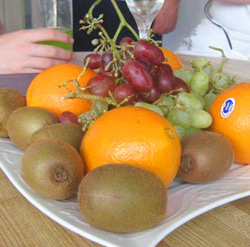 Strategies to support healthier diets among seniors need to take into account differences between elderly men and women, according to UBC research.
Strategies to support healthier diets among seniors need to take into account differences between elderly men and women, according to UBC research.
The two groups had varying responses to a tactic thought to boost seniors’ fruit and vegetable intake, according to a study published in Appetite.
The study explored which types of social support encouraged seniors to boost their daily intake of fruits and vegetables.
Social support, typically provided by friends and family, comes in different forms. It ranges from emotional support, which bolsters one’s sense of self, to tangible support, which offers assistance with daily tasks such as shopping and cooking.
Researchers found women responded positively to emotional support, but that wasn’t the case for tangible support.
“This may mean that emotional support is encouraging women to cook for themselves, and that the meals they prepare contain more fruits and veggies than those made for them,” said Emily Rugel, the study’s lead author and a PhD candidate at UBC’s School of Population and Public Health.
A guideline of five servings per day has been linked to a range of health benefits, including lower rates of stroke, cancer, depression and dementia. However, less than half of Canadians aged 65 and older meet the five-a-day guideline.
“We should focus on strengthening social support as one way of ensuring that older adults eat enough fruit and vegetables,” said Rugel. “But we really need to take gender differences into account as part of this process.”
Men did not respond significantly to the different types of social support examined in the study.
“This means that there’s an opportunity that we’re missing: to encourage or provide friends and family members of older adults with the tools they need,” she noted.
Canada’s elderly population is on the rise. As of 2012, adults 65 and older made up roughly 15 per cent of the population, and they are expected to account for more than 25 per cent of the population by 2036.
Rugel recommends education campaigns stressing the importance of the five-a-day guideline to those who care for seniors, as well as increased access to free or low-cost produce for care providers.
BACKGROUND
The study, “Gender differences in the roles for social support in ensuring adequate fruit and vegetable consumption among older adult Canadians,” is published in Appetite. Rugel’s co-author, Richard Carpiano, is a professor in UBC’s department of sociology.
Findings were based on surveys conducted with 14,221 Canadians aged 65 and over; 55 per cent of the respondents were women and 45 per cent were men.
The study divided social support into two categories: tangible and emotional/informational. Tangible support refers to assisting with tasks such as shopping and cooking. Emotional/informational support refers to efforts that help bolster one’s sense of importance and ability to tackle tasks such as cooking, along with actions such as providing recipes and suggestions for meal preparation.
Story Source:
The above post is reprinted from materials provided by University of British Columbia. Note: Materials may be edited for content and length.
Journal Reference:
Emily J. Rugel, Richard M. Carpiano. Gender differences in the roles for social support in ensuring adequate fruit and vegetable consumption among older adult Canadians. Appetite, 2015; 92: 102 DOI: 10.1016/j.appet.2015.05.011